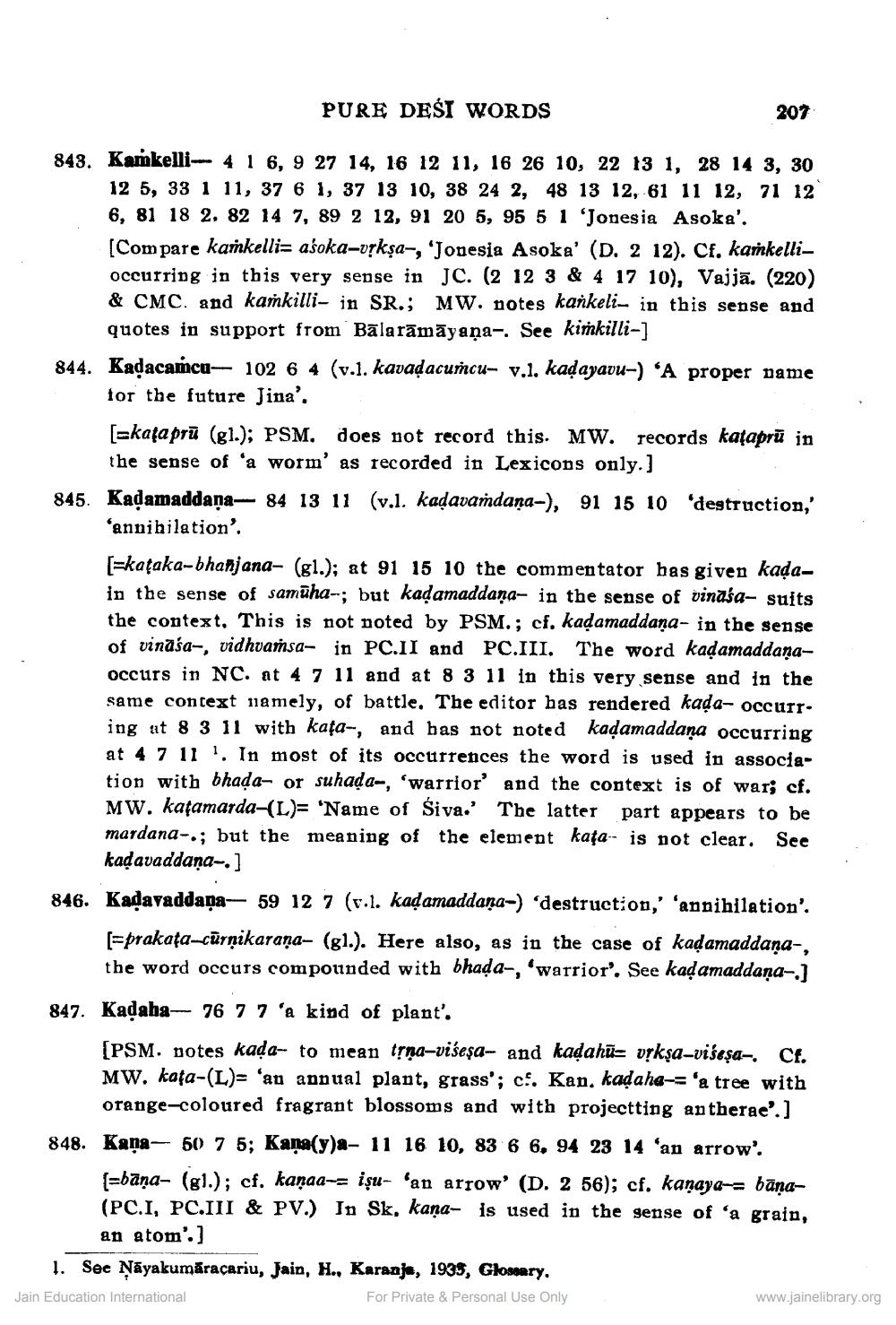________________
PURE DESI WORDS
207
843. Kamkelli- 4 1 6, 9 27 14, 16 12 11, 16 26 10, 22 13 1, 28 14 3, 30
12 5, 33 1 11, 37 6 1, 37 13 10, 38 24 2, 48 13 12, 61 11 12, 71 12 6, 81 18 2. 82 14 7, 89 2 12, 91 20 5, 95 5 1 'Jonesia Asoka'. (Com pare kamkelli= aśoka-uşkşa-, 'Jonesia Asoka' (D. 2 12). Cf. karkellioccurring in this very sense in JC. (2 12 3 & 4 17 10), Vajjā. (220) & CMC. and kaṁkilli- in SR.; MW. notes kankeli- in this sense and
quotes in support from Bălarāmāyaṇa-. See kirkilli-] 844. Kadacamcu— 102 6 4 (v.1. kavadacuộcu- v.1. kadayavu-) 'A proper name
for the future Jina'. [=kata prū (gl.); PSM. does not record this. MW. records kataprū in
the sense of a worm' as recorded in Lexicons only. ] 845. Kadamaddaņa- 84 13 11 (v.1. kadavamdana-), 91 15 10 'destruction,
'annihilation'.
[=kataka-bhanjana- (gl.); at 91 15 10 the commentator has given kadain the sense of samūha-; but kadamaddaņa- in the sense of vinaśa- suits the context. This is not noted by PSM.; cf, kadamaddana- in the sense of vinasa-, vidhvansa- in PC.II and PC.III. The word kadamaddanaoccurs in NC. at 4 7 11 and at 8 3 11 in this very sense and in the same context namely, of battle. The editor has rendered kada- occurring at 8 3 11 with kata-, and has not noted kadamaddana occurring at 4 7 11 1. In most of its occurrences the word is used in association with bhada- or suhadam, 'warrior' and the context is of war; cf. MW. katamarda-(L)= 'Name of Śiva.' The latter part appears to be mardana-.; but the meaning of the element kata-- is not clear. See
kad avaddana-. ] 846. Kadavaddaņa— 59 12 7 (vol. kadamaddana-) 'destruction,' 'annihilation'.
Eprakata-cūrņikarana- (gl.). Here also, as in the case of kadamaddana-, the word occurs compounded with bhada-, 'warrior'. See kadamaddaņa-.]
847. Kadaba-- 76 77 'a kind of plant'.
(PSM. potes kada- to mean tļņa-višeşa- and kadahū= vşkşa-višeşa. Cf. MW. kata-(L)= 'an annual plant, grass'; c.. Kan, kadaha-'a tree with
orange-coloured fragrant blossoms and with projectting an therae'.] 848. Kana- 50 7 5; Kana(y)a- 11 16 10, 83 6 6. 94 23 14 'an arrow'.
(=bāņa- (gl.); cf. kanaa-= işu- 'an arrow' (D. 2 56); cf. kanaya-= būņa(PC.I, PC.III & PV.) In Sk, kana- is used in the sense of ‘a grain,
an atom'. ] 1. Sec Ņāyakumāraçariu, Jain, H., Karanje, 1935, Glossary, Jain Education International For Private & Personal Use Only
www.jainelibrary.org




